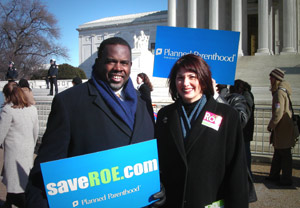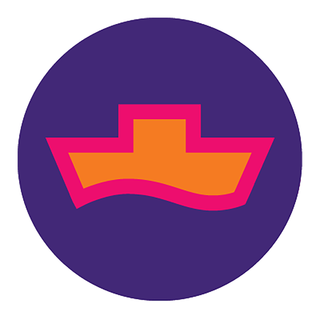
The United States abortion-rights movement is a sociopolitical movement in the United States supporting the view that a woman should have the legal right to an elective abortion, meaning the right to terminate her pregnancy, and is part of a broader global abortion-rights movement. The movement consists of a variety of organizations, with no single centralized decision-making body.

Henekh "Henry" Morgentaler,, was a Polish-born Canadian physician and abortion rights advocate who fought numerous legal battles aimed at expanding abortion rights in Canada. As a Jewish youth during World War II, Morgentaler was imprisoned at the Łódź Ghetto and later at the Dachau concentration camp.

Abortion in Canada is legal at all stages of pregnancy, regardless of the reason, and is publicly funded as a medical procedure under the combined effects of the federal Canada Health Act and provincial health-care systems. However, access to services and resources varies by region. While some non-legal barriers to access continue to exist, Canada is the only nation with absolutely no criminal restrictions on abortion. Abortion availability is, however, subject to provincial health-care regulatory guidelines for physicians. The general rule is that few providers offer abortion care beyond 23 weeks and 6 days, but there can be exceptions in certain cases.
Abortion in New Zealand is legal within the framework of the Abortion Legislation Act 2020, which permits the termination of pregnancy for up to birth and removed abortion from the Crimes Act 1961. After 20 weeks, abortion is permitted only if a health practitioner deems it "clinically appropriate" and consults at least one other health practitioner. Abortion is illegal only if a person who is not a licensed health practitioner procures or performs it. In March 2022, New Zealand implemented explicit "safe access zones" by legislation around abortion clinics and/or hospitals.
Reproductive rights are legal rights and freedoms relating to reproduction and reproductive health that vary amongst countries around the world. The World Health Organization defines reproductive rights as follows:
Reproductive rights rest on the recognition of the basic right of all couples and individuals to decide freely and responsibly the number, spacing and timing of their children and to have the information and means to do so, and the right to attain the highest standard of sexual and reproductive health. They also include the right of all to make decisions concerning reproduction free of discrimination, coercion and violence.

Women on Waves (WoW) is a Dutch pro-choice nongovernmental organization (NGO) created in 1999 by Dutch physician Rebecca Gomperts, in order to bring reproductive health services, particularly non-surgical abortion services and education, to women in countries with restrictive abortion laws. Other services offered by WoW include contraception, individual reproductive counseling, workshops, and education about unwanted pregnancy. Workshops are conducted for lawyers, doctors, artists, writers, public health care activists, as well as for women and men to learn about contraceptive practices and non-surgical, DIY abortion using RU-486. Services are provided on a commissioned ship that contains a specially constructed mobile clinic, the A-Portable. When WoW visits a country, women make appointments, and are taken on board the ship. The ship then sails out approximately 20 km, to international waters, where Dutch laws are in effect on board ships registered in the Netherlands. Once in international waters, the ship's medical personnel provide a range of reproductive health services that includes medical abortion.
An abortion clinic is a medical facility that provides abortions. Such clinics may be public medical centers, private medical practices or nonprofit organizations such as Planned Parenthood.
An abortion fund is a non-profit organization that provides financial and logistical assistance to individuals who cannot afford the costs of an abortion. Abortion funds play a role in financing abortion services in countries where abortion is legal but not accessible. For example, health insurance may not cover abortion or transportation to abortion clinics may be financially or logistically unfeasible. Abortion funds also provide assistance in cities, states, providences or countries where abortion is illegal and women must travel elsewhere to obtain a legal abortion.

An abortionclinic escort is an individual who volunteers at an abortion clinic or family planning clinic. Their role is to assist patients and staff to enter and exit these facilities safely, and to prevent any potential harassment or danger to individuals. A clinic escort's role at a family planning clinic encompasses myriad different tasks, which can also vary between clinics.
Governments sometimes take measures designed to afford legal protection of access to abortion. Such legislation often seeks to guard facilities which provide induced abortion against obstruction, vandalism, picketing, and other actions, or to protect patients and employees of such facilities from threats and harassment.
This is a timeline of reproductive rights legislation, a chronological list of laws and legal decisions affecting human reproductive rights. Reproductive rights are a sub-set of human rights pertaining to issues of reproduction and reproductive health. These rights may include some or all of the following: the right to legal or safe abortion, the right to birth control, the right to access quality reproductive healthcare, and the right to education and access in order to make reproductive choices free from coercion, discrimination, and violence. Reproductive rights may also include the right to receive education about contraception and sexually transmitted infections, and freedom from coerced sterilization, abortion, and contraception, and protection from gender-based practices such as female genital mutilation (FGM) and male genital mutilation (MGM).

Reproductive justice is "the human right to maintain personal bodily autonomy, have children, not have children, and parent the children we have in safe and sustainable communities," according to SisterSong Women of Color Reproductive Justice Collective, the first organization founded to build a reproductive justice movement. In 1997, 16 women-of-color-led organizations representing four communities of color – Native American, Latin American, African American, and Asian American – launched the nonprofit SisterSong to build a national reproductive justice movement. Additional organizations began to form or reorganize themselves as reproductive justice organizations starting in the early 2000s.
The Abortion Caravan was a feminist protest movement formed by The Vancouver Women's Caucus in 1970 which travelled across Canada from Vancouver to Ottawa to advocate for increased access to legal abortion. A 1969 amendment to the Canadian Criminal Code legalized abortion under certain circumstances. Unhappy with this incremental step, the Abortion Caravan advocated for abortion to be completely removed from the Criminal Code. Upwards of 300 supporters gathered in Ottawa on Parliament Hill and at the residence of the Prime Minister at the time, Pierre Elliot Trudeau, to protest the amendment. The Abortion Caravan paved the way for future abortion activism as well as helped initiate a revocation of abortion laws in 1988. At the time of the abortion caravan there were also a number of anti-abortion organizations who wished to eliminate access to abortions in Canada. To this day, there are abortion rights and anti-abortion organizations working to promote their positions, including Action Canada's celebrating the 50th anniversary of the 1970 Abortion Caravan.
Canadian Association for Repeal of the Abortion Law (CARAL) was a coalition of abortion rights activists, created in 1974, to protest the incarceration of Dr. Henry Morgentaler, who was jailed for providing safe, yet not legalized, abortions in Canada. The organization later changed its name to the Canadian Abortion Rights Action League (CARAL/ACDA).

Abortion-rights movements, also referred to as pro-choice movements, advocate legal access to induced abortion services including elective abortion. It is the argument against the anti-abortion movement. The abortion rights movement seeks to represent and support women who wish to terminate their pregnancy at any point. This movement attempts to establish a right for women to make the choice to have an abortion without fear of legal and/or social backlash. The issue of induced abortion remains divisive in public life, with recurring arguments to liberalize or to restrict access to legal abortion services. Abortion-rights supporters themselves are divided as to the types of abortion services that should be available and to the circumstances, for example different periods in the pregnancy such as late term abortions, in which access may be restricted.
Abortion in Uganda is illegal unless performed by a licensed medical doctor in a situation where the woman's life is deemed to be at risk.
Abortion in Thailand has been legal up to 12 weeks of pregnancy since 7 February 2021. Following a 2020 ruling of the Constitutional Court which declared a portion of the abortion statutes unconstitutional, the Parliament removed first-term abortion from the criminal code. Once strict, over time laws have been relaxed to take into account high rates of teen pregnancy, women who lack the means or will to raise children, and the consequences of illegal abortion.
Abortion in Maryland is legal up to the point of fetal viability. 64% of adults said in a poll by the Pew Research Center that abortion should be legal and 33% said that it should be illegal in all or most cases.
Abortion in Malaysia is illegal. It is regulated under Sections 312–316 of the Penal Code. Access to abortion in Malaysia has been hampered by religious, cultural, and social stigmas against abortion, poor awareness of abortion legislation among health professionals, and the high cost of abortion services in the private health sector. As a result, illegal and risky unsafe abortions are prevalent in Malaysia, including self-induced abortions.






